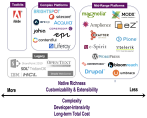Is WCM fundamentally broken?
Last week I attended a conference panel LBi's Jon Marks (a.k.a., @mcboof). The theme of this panel was "How do we fix WCM?" The session even had a Twitter hashtag - #fixwcm – where Jon crowd-sourced the Twitter community for their ideas.
While my fellow panelists brought up many cogent arguments for why web content management is broken, the most poignant moment of the session was when a gentleman in the front row of the audience told a story of picking a Web CMS and only after the implementation had started realizing that the organization had picked a system incapable of doing what they wanted to do. He told how his company did not do adequate research and due diligence when selecting the product and described the disaster that resulted when the project ultimately had to be stopped and delayed by two years and untold thousands of dollars.
Surely, this is an example of how WCM is broken, right? I say no.
WCM can be broken if an enterprise picks a system that is designed for different scenarios. WCM can be broken if a WCM vendor misleads potential buyers by embellishing their products' capabilities. WCM can be broken if a client's requirements or budget are unreasonable. WCM can be broken if an implementer or systems integrator doesn't configure, customize, or extend the system properly.
 But, WCM is not inherently broken. Heading into 2010, the WCM marketplace is more vibrant than ever. In our recently released WCM research, we broke up 42 of the most significant WCM players into 5 tiers of systems: Complex Enterprise Platforms, Upper-Range Platforms, Mid-Range Platforms, Mid-Range Products, and Simpler Products. In each of these tiers, buyers have varying license, deployment, and technology options.
But, WCM is not inherently broken. Heading into 2010, the WCM marketplace is more vibrant than ever. In our recently released WCM research, we broke up 42 of the most significant WCM players into 5 tiers of systems: Complex Enterprise Platforms, Upper-Range Platforms, Mid-Range Platforms, Mid-Range Products, and Simpler Products. In each of these tiers, buyers have varying license, deployment, and technology options.
Buyers today can choose between platforms and products; traditionally installed, hosted, or pure SaaS deployment models; traditional license or the many flavors of open source; one of many pricing models; and a variety of vertical-specific expertise.
There is healthy competition among vendors and unlike some other markets, there is no one system dominating the WCM world. The web content management system buyer has a plethora of choices and options. I, for one, think this is a good thing.
We talk to a lot of Web CMS customers on a regular basis. Each story is different, and there's a spectrum of satisfaction with the choices they've made. Many customers are frustrated, but just as many can point to success stories. Implementing content management in a fast-changing web environment is hard, but not impossible.
So, is WCM perfect? No. But it is not broken either.








